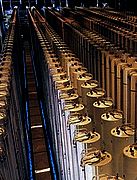Nuclear Deal: Differences on 13 Issues
» On the First Day of the Fourth Round of Talks
On the first day of this round of nuclear talks that began this week between Tehran and six major powers, the two sides started drafting their final agreement. Iranian officials have said that in addition to this round, they would need another three rounds to conclude their final agreement.
Iran’s chief negotiator Abbas Araghchi gave the figure 13 for the number of differences between Iran and the P5+1 to reach the final agreement.
As of 4pm on Wednesday May 14, 2014 local time in Vienna, Austria where this round of talks are being held, Iran’s foreign minister Mohammad Javad Zarif sat with Katherine Ashton, the chief EU coordinator in the talks to start drafting the final draft of the accord. Both sides have said that the differences between them will be raised and discussed by the two sides during this phase.
On Tuesday Zarif had said that in addition to the talks in Vienna, three additional rounds of talks would be held by the last week of July. Araghchi complimented that by adding that that two meetings will be held in the Persian month of Khordad (ending in June 21st) and the final round will be held in the Persian month of Tir (June 22 to July 22), indicating that the last round would probably last several days.
Zarif has mentioned the sensitivities surrounding the final draft. “When you start drafting the text of the agreement, it is possible that differences may emerge over simple things such as a comma or a period in the text. These things cannot be predicted in advance, which is why we have scheduled at least three additional rounds of talks.”
It appears that the issues relating to Iran’s right to enrich uranium, the number of operating and functional centrifuges, and the Arak heavy water nuclear reactor and on top of the list, the manner in which the international sanctions against Iran will be lifted are among the most important challenges facing the drafting phase.
Reports have also indicated that Iran’s missile program is also a concern that the West may decide to raise and limit its size during the talks. Western diplomats have not till now officially raised this issue in public, although one such officials told AP that it was possible that Iran’s missile capability and tests too would be discussed during the trade-off options in the talks.
Earlier this week, ayatollah Khamenei, who now undisputedly and clearly supervises the talks, made remarks to this effect while on a visit to a missile production plant belonging to the Revolutionary Guards and labeled the notion of including the country’s missile capabilities in the talks as “stupid.” They expect limits on Iran’s missile program at a time when they continuously threaten Iran militarily; therefore an agreement on this is stupid and idiotic,” he said.
In his talk, Khamenei repeated his usual tirade and said. While standing next a model of a US drone that Iran is said to have “captured” over its territory in 2011(the RQ-170 Sentinel) Khamenei said that Wests’ “irrational” behavior was an indication of its definitive defeat by the “Iranian nation.” He also directed the air-space wing of the Revolutionary Guards to continue its programs with precision and “not be content with the current levels.”
This statement aside, the leader has generally been publicly supportive of the country’s talks with the West. “I have always been and am supportive of initiatives and talks in foreign policy and my regular advice to officials has been that they should utilize all and every initiative in foreign policy and international relations,” he said this week. At the same time, he issued a warning that the needs of the country and some issues such as international sanctions should not be tied to the nuclear talks.
At the same time, Khamenei’s top advisor on foreign policy, Ali Akbar Velayati also spoke about the nuclear talks. Responding to calls by some Majlis deputies who had asked for former hardline negotiator Saeed Jalili to be included in the backend team, he criticized former president Mahmoud Ahmadinejad’s negotiating team and once again threw in his verbal support for Rouhani’s team. He specifically said that the current negotiating team demonstrated experience during the talks and that the Islamic republic was both aware and “trustful” of the team’s work.
In addition to being the lead nuclear negotiator for Iran during Ahmadinejad’s administration, Saeed Jalili was also a presidential candidate in 2009 who was supported by hardline conservatives mostly grouped under the rubric of Steadfast Front. This group has been the most vocal opponent of the November 2013 interim nuclear agreement between Iran and the P5+1 major world powers and has also regularly and at times very harshly criticized the work of the current negotiations team in Rouhani’s administration.


